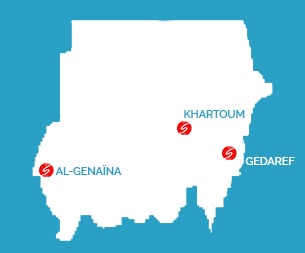On 15th April 2023, Khartoum, the capital of Sudan, was plunged into a merciless war that spread over a large part of the country in the space of a few days. The factions fighting for control of the country paralyzed agriculture, trade and all economic activity to the point where observers had been worrying for months that a famine was imminent. Today, warning lights are flashing red, however, reactions are still slow in coming.
“All the markets have been attacked and looted. People have lost everything they owned. We had to go from house to house to collect supplies and water, but we were shot at if we went outside. Four of my neighbours, including two children, were killed when they went to fetch water from the pump in the early hours of the morning,” says Aldambari, an aid worker with SOLIDARITÉS INTERNATIONAL. In Geneina, the capital of West Darfur, a system of mutual aid between neighbours, based on the sharing of resources and provisions, was established during the first weeks of the conflict, as in October 2023. But the situation was untenable, and many people fled the fighting towards Chad, a neighboring country which has taken in more than 560,000 people since the start of the conflict.
Sudanese agriculture comes to a standstill
After a year of fighting, the millet and sorghum fields have become battlefields. Devastated by the fighting, last year’s harvest failed, and the fields could not be sown. In West and Central Darfur, only around 10% of the land was able to be cultivated¹. This is because farmers were unable to reach their fields, lack the resources to buy seeds, the unavailability of inputs and the destruction of irrigation systems. While exports to other towns and countries bordering on Sudan were efficient before the war, the agricultural sector has come to a standstill due to the fighting. Thousands of people are living in displacement camps in North Darfur, with no access to markets or drinking water. The humanitarian situation is indefinable.
Sudan
Context and action- 43 million inhabitants
- 172nd out of 191 countries on the Human Development Index
- 21.000 people helped
As a result, the situation today is more than dramatic. “If nothing is done,“ Justine Muzik Piquemal, Regional Director for SOLIDARITÉS INTERNATIONAL, reminded us in a press release last February, “we are heading straight for a famine situation, particularly in the Darfur states!” Reality has exceeded her predictions.
“The population is reduced to eating wild food such as tree leaves, nuts, and fruits. While this is a common practice in some countries, it was not the case in Sudan before the war. Families are selling their last belongings, their last jewellery, and sometimes even their horses and donkeys, to feed themselves. Parents go without meals to leave food for their children. Many people have enough food for only one meal per day, and some not even that” explains Annie Brett. Annie is in charge of carrying out an assessment of the food situation in the province around Geneina for SOLIDARITÉS INTERNATIONAL. Her initial findings show that, despite the situation, farmers are keen to get back to cultivating their land: “The farmers I meet are certainly asking for emergency food aid, but also for seeds, tools, irrigation pumps, vaccines and medicines for their livestock”.
Countering economic collapse
In addition to the agricultural sector, the entire economy has been destroyed by the war. Sectors that employed people on a daily basis, such as construction, have stopped. The administration no longer functions, and markets, while starting to function again, are a fraction of their previous size. “Everyone is looking for work, but there isn’t any. People are selling firewood from the fields, but no one has the money to pay for it“ explains Annie. According to Fewsnet, prices are on average 45% higher than last year. “Everything is expensive. Even if the markets were supplied, people wouldn’t be able to buy anything“, confirms Aldambari.
In the west, the situation is catastrophic, but the east of the country is not to be outdone. In Gedaref, Sudan’s former breadbasket, thousands of displaced people have arrived from Khartoum and Madani. Inhabitants, often already living in precarious conditions, have welcomed these displaced people, putting further pressure on their resources.
While part of the solution lies in the distribution of emergency food aid, it is important not to limit ourselves to this form of humanitarian support: “We also need to think about tomorrow, because if we don’t think about the next harvest season, we’ll find ourselves in a similar or even worse situation“, says Annie. So right now, while war is still raging in the country, we need to support farmers so that they can resume growing crops on their land where access is secured, and support livestock owners to prevent further death of their animals. This agricultural production will bolster local food markets in a few months‘ time, once the peak of emergency food distributions has passed, and will support opportunities for income.
Humanitarian aid needs to be thought and scaled up to match the scale of the food disaster currently unfolding in Sudan.
“What I find deeply scandalous is this inability to anticipate famine. We see it coming, but we do nothing. We’ve known about the situation for several months now, and there’s nothing to suggest that it’s going to get any better. I don’t even know how it’s possible to get to this point without the international community reacting!””,concludes Fanny Vagne, field coordinator in Geneina for SOLIDARITÉS INTERNATIONAL.
Sources:
¹According to the CERF (Central Emergency Response Fund)
Header photo: © Abulmonam Eassa

